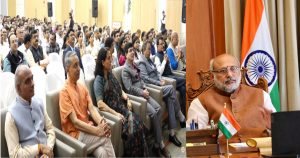23.10.2024: UGC Conference on the theme ‘Implementation of National Education Policy 2020’ organised by IIM, Nagpur

UGC Conference on the theme ‘Implementation of National Education Policy 2020’ organised by IIM, Nagpur on 23 October 2024
I touch and salute the holy feet of Bharath Mata, the Most Powerful and the Most Merciful
Professor M. Jagadesh Kumar, Chairman, UGC,
Dr. Bhimaraya Metri, Director, IIM Nagpur,
Dignitaries on the dais,
Academic Mentors,
Directors and Principals from the Western Zone of the country, it is an immense pleasure to address you all today from IIM Nagpur.
In my capacity as Chancellor of Universities in Maharashtra, I am pleased to be part of this UGC Conference on the theme of the ‘Implementation of the National Education Policy 2020.’
I extend my heartiest congratulations to IIM Nagpur for organizing this important Conference, which I believe is both timely and relevant.
Today, India stands ahead of many nations, with a special focus on education.
The country is well-prepared to offer high-quality education at every stage. We are equipped with world-class infrastructure, top-tier academic resources, and numerous avenues for groundbreaking research, distinguishing us globally.
The National Education Policy 2020 is a transformative step in this direction. It has the potential to create immense, long-lasting change in the coming years and decades. The policy sets forth four clear and ambitious goals:
To bring about transformational reforms in education and position India as a global knowledge superpower.
To ensure that our education system provides high-quality learning to all, regardless of economic or social background.
To increase the gross enrolment ratio from the current 28% to 50% by 2035.
To nurture graduates from the Indian higher education system who are equipped to become global citizens.
If we achieve these goals, we will be well on the path to realizing the vision of a developed India, or Viksit Bharat, by 2047.
Our collective efforts must be directed toward realizing the objectives of NEP 2020, which are built on five guiding pillars: Access, Equity, Quality, Affordability, and Accountability.
At the school level, the policy aims to universalize pre-primary education and emphasizes foundational literacy and numeracy for all primary school children by 2025.
The reforms it proposes will elevate the quality of education by focusing on core values, cognitive skills, critical thinking, and problem-solving abilities.
NEP 2020 also emphasizes multidisciplinary and holistic education, institutional autonomy, quality research through the National Research Foundation, continuous professional development for teachers, and the integration of technology.
Its recommendations for the internationalization of higher education, restructuring of governance, and promotion of multilingual education will revolutionize the education system in our country.
For this ambitious policy to succeed, it requires the collaborative efforts of all stakeholders—the Centre, States, Union Territories, Higher Education Institutions (HEIs), regulatory agencies, and, most importantly, you as educators.
Your role is pivotal in ensuring that India fully benefits from this policy and moves forward on its growth trajectory.
I am pleased to note that the University Grants Commission (UGC) has already initiated nearly 50 actions to enable Higher Education Institutions to implement NEP 2020.
These efforts are essential to creating a flexible, multidisciplinary, and globally benchmarked higher education ecosystem in India. Initiatives like the Academic Bank of Credits, National Credit Framework, and Professor of Practice are transforming the landscape by fostering student mobility, credit transfer, and industry-academia collaboration, leading to graduates who are highly relevant in today’s global job market.
The National Credit Framework is especially noteworthy, as it seamlessly integrates skill education with academic learning from preschool to the doctoral level.
The new ‘Apprenticeship Embedded Degree Programme’ is a game-changer, providing students the opportunity to apply the knowledge they gain during their courses in real-world settings.
I extend my heartiest congratulations to the Chairman of the UGC and his team for these forward-thinking initiatives and for organizing conferences like this in collaboration with state governments and higher education councils.
However, success will only be realized through the collective and timely efforts of all of us here. I urge you, as leaders of higher education institutions, to lead by example in the effective implementation of NEP 2020.
IIM Nagpur, the host of this Conference, is an ideal venue for such discussions. It is distinguished by its commitment to addressing the needs of modern India through innovative management education and research.
IIM Nagpur’s rapid growth and achievements, especially its leadership in adopting NEP 2020, are truly commendable.
As one of the new-generation IIMs established in 2015, it has already carved out a prominent position in the field of management education, and it continues to innovate with programs like Cybersecurity and Blockchain.
The Institute’s intellectual capital and excellent connectivity have made it one of the fastest-growing business schools in India.
I am confident that this Conference, held under the guidance of the University Grants Commission will provide invaluable learning experiences.
I request that the outcomes of this Conference be shared with us, so that we can take further policy-level interventions across the Western Zone.
Today, we are witnessing a new dawn of hope and direction for the education sector, and particularly for higher education institutions. I wish the Conference every success and look forward to seeing its positive impact in the near future.
Dhanyavad !
Jai Hind ! Jai Maharashtra !



